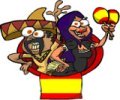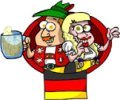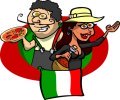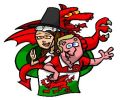Celebrating Easter in France
Pâques

Imagine the Easter bunny says,
"PARK your Easter
eggs right here in this basket!"
The word in French for Easter - Pâques - sounds very much like "PARK" in English (but with a shorter vowel sound).
Pâques
The French word for Easter is Pâques.
(Be careful: if you don't put an -s at the end of Pâques, it designates the Jewish holiday, which is different from the Christian one)
Le mot français pour dire Easter est Pâques.
Attention: si vous ne mettez pas de -s à la fin de Pâques, ça désigne la fête juive, qui est différente de la fête chrétienne.
A LITTLE HISTORY - UN PEU D'HISTOIRE
Originally, Easter Day celebrates the resurrection of the Christ. Easter is also the day when the Fasting (in French le Carême) ends.
A l'origine, Pâques célèbre la résurrection du Christ. Pâques est aussi le jour où le jeûne du Carême se termine.
For a long time, both the Christian and the Jewish holiday were on the same day because people used to use the Jewish calendar.
Pendant longtemps, les fêtes chrétienne et juive tombaient le même jour, car les gens utilisaient le calendrier juif.
In 325, the emperor Constantine decided to change the date of Easter for two reasons: he wanted Easter to fall on Sundays, regardless of the Jewish calendar, and he also wanted the Christian Easter to be separate from the Jewish one. Therefore, it was decided that from then on, Easter Day would be on the Sunday following the full moon after the spring equinox. Usually, it falls between March 22nd and April 25th.
En l'an 325, l'empereur Constantin décida de changer la date de Pâques, pour deux raisons : il voulait que Pâques tombe un dimanche, indépendamment du calendrier juif, et il voulait également que la fête chrétienne soit différenciée de la Pâque juive. Il a donc été décidé qu'à partir de là, Pâques tomberait le dimanche suivant la pleine lune après l'équinoxe de printemps. En général, c'est entre le 22 mars et le 25 avril.
SYMBOLS - SYMBOLES The Eggs - Les œufs
Way before eggs became a symbol of Easter, they were a strong symbol of life. Eggs would represent the beginning of life in many legends. In antiquity, Romans and Egyptians would offer decorated eggs to the others. Later, during Fasting, people kept the eggs that chickens laid - and that they couldn't eat - to decorate and offer them. The tradition remains quite the same nowadays, and people offer chocolate eggs to each other.
Bien avant que les oeufs ne deviennt un symbole de Pâques, ils étaient un symbole fort de la vie. Les oeufs représenteraient le début de la vie dans de nombreuses légendes. Dans l'Antiquité, les Romains et les Egyptiens avaient l'habitude de s'offrir des oeufs décorés. Plus tard, pendant le Carême, les gens gardaient les oeufs pondus par les poules (et au'ils ne pouvaient pas manger), pour les décorer et les offrir. La tradition est presque la même aujourd'hui, et les gens s'offrent des oeufs en chocolat.
Easter Bunny - Le Lapin de Pâques
There seem to be several origins of this symbol, depending on the region.
Il semble y avoir plusieurs origines de ce symbole, qui diffèrent selon les régions.
In the Germanic regions, rabbits are the symbol of fecundity and revival, such as spring. The Germans exported this tradition to the US where it spread and became really common. In France, the Easter Bunny is a symbol in the Eastern regions (which have a Germanic influence).
Dans les régions germaniques, le lapin est le symbole de la fécondité et du renouveau, tout comme le printemps. Les allemands ont exporté cette tradition aux Etats-Unis où elle s'est développée et est devenue très courante. En France, le lapin de Pâques est un symbole dans les régions de l'est (qui ont une influence germanique).
In the UK, the rabbit is more likely to come from the goddess of spring and dawn, Eastre. Her name became the name for Easter and her symbol, the rabbit, became the symbol of Easter.
Au Royaume-Uni, le lapin viendrait plutôt de la déesse du printemps et de l'aube Eastre. Son nom a donné le nom de Easter (Pâques) et son symbole, le lapin, est devenu le symbole de Pâques.
The Bells - Les Cloches
In Belgium and in the rest of France, bunnies don't bring eggs, but bells do. From the Thursday before Easter, they stop ringing, as a sign of mourning. They are said to go to Rome where they are blessed, and on their way back, they bring eggs.
En Belgique et dans le reste de la France, ce ne sont pas les lapins qui apportent les oeufs, mais les cloches. Depuis le jeudi avant Pâques, elles arrêtent de sonner en signe de deuil. On dit au'elles se rendent Rome pour être bénies, et qu'en revenant, elles sèment des oeufs sur leur passage.
VOCABULARY - VOCABULAIRE
Oeuf sur le plat: fried egg
Oeuf en chocolat: chocolate egg
Oeuf à la coque: boiled egg
Oeuf dur: hard-boiled egg
Oeuf mollet: soft-boiled egg
Etouffer quelque chose dans l'oeuf: to nip something in the bud.
Ne pas mettre tous les oeufs dans le même panier: never put all your eggs in one basket.
Tête d'oeuf! = you nincompoop!
Sauter à cloche-pied: to hop
Avoir la cloche fêlée: (Literally) Having one's bell cracked.
Meaning, being crazy.
Sonner les cloches de quelqu'un: (Literally) To ring someone's bells.
Meaning, to bring someone back down to earth.
Même son de cloche: (Literally) The same bells ring.
Meaning, same version of the facts.
Il y a quelque chose qui cloche: (Literally) There is something (alarm bells) ringing. Meaning, there is something wrong.
Clochette: small bell
Fée Clochette: Tinker Bell
Solstice d'été/d'hiver: summer/winter solstice
Équinoxe de printemps/d'automne: spring/autumn equinox
Allison Ruer
200 Words a Day! Accelerated Language learning
Learn Spanish |
Learn French |
Learn German |
Learn Italian |
Learn Welsh |
200 Words a Day! Free Daily French Verb Online - fully conjugated
200 Words a Day! and Exceltra
©Copyright
2004-2023 All Rights Reserved
French learning Made Fun with Easter in France.
IMAGINE how you'd
FEEL
seeing yourself learning at a rate of 200 words a day ... the ideal companion course that complements any language course.
|










New! Comments
Have your say about what you just read! Leave us a comment in the box below.